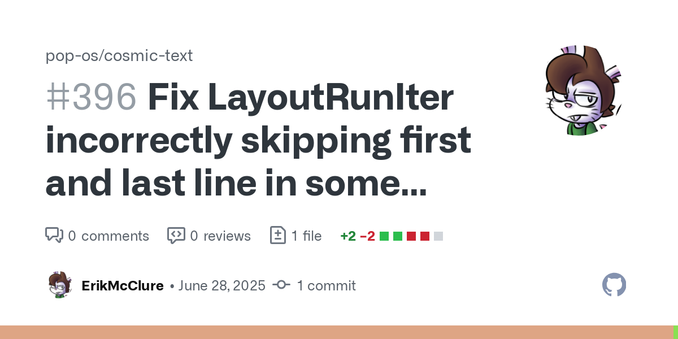Fundament 🜂 Software
| Homepage | https://erikmcclure.com |
| Bandcamp | http://erikmcclure.bandcamp.com/ |
| Pronouns | He/Him |
| ΘΔ Fae | Rabbit |
| Homepage | https://erikmcclure.com |
| Bandcamp | http://erikmcclure.bandcamp.com/ |
| Pronouns | He/Him |
| ΘΔ Fae | Rabbit |

TL;DR: LayoutRunIter is comparing the text baseline to the top and bottom of the buffer bounds, instead of using the maximum ascent when comparing against the bottom, and the maximum descent when c...
I have watched my life burn to the ground and started again from scratch many, many times.
I believe in second acts and second chances.
I want to say this clearly for anyone who needs to hear it: it is possible to survive radical, unexpected and unwanted life changes, to start again, and to build a new life that is worth living.
killed by nameless forces which seek civilization's ruin at the alter of their own greed,
academia is a corpse, long dead
it does not lie in it's death throes, those have long passed
the damage done to the world worse than any nuclear blast
it sits there decaying, leaching into the waters, poisoning it's surrounds
a rot that sickens the earth and it's creatures
parasites descend from around to feast upon that which once granted miracles
in it's name they claim accolades and great works, hucksters most of all
occasionally, revelations granted from the flesh that once lived
it's death has scattered knowledge and danger about
the space in which concepts reside is now a place filled with mines
a mind field, if you will
The thing I really wasn't prepared for trying to persuade Microsoft leadership of things was their complete lack of vision. I have a pretty clear idea of how I think the future of computing should look and I've spent the last 20 years working on projects that either contribute to that goal or give me skills I need to build it. I didn't expect MS leadership to share that vision but, as I've often had to do in F/OSS projects, I expected that we'd find some common aspects where my vision and theirs would both benefit from some shared core technology. I really wasn't prepared for the fact that they have absolutely no long-term goals at all.
I'm not a big fan of Bill Gates (for so many reasons), but under his leadership there was a clear goal: A computer on every desk. I disapprove of a lot of what they did to achieve that goal and it's also quite clear that there was a lot of fuzziness about what that computer should do once it was on the desk (some of that wasn't bad: Gates understood the value of ecosystems and wanted to enable other people to build things on top of that foundation). But there was a goal. And the company was focused on building that goal.
Similarly, Steve Jobs had a clear vision of how computers should behave and be programmed. After leaving Apple, he set up NeXT to build the computer he wanted to use. After he returned, Apple's focus was on trying to make that computer cheap enough that they could sell a lot of them (NeXT sold around 50K computers over the course of a decade because they cost about ten times what most people could afford). Apple grew because it was building products Steve Jobs wanted to use, and he had a vision of how they should work. Again, you may disagree with that vision, but it was a mostly consistent view of how computing should work and the company was focused around building things that aligned with that goal.
But Nadella, Scott, and the people that they surround themselves with have no vision. It's not that I think their vision is bad, it's that it doesn't exist at all. If you ask them what computing should look like in ten or twenty years, they have no idea.
I thought for a while that they were just bad at communicating it, or that they were worried about the competition getting there first and so kept it secret, but it became clear over time that it just wasn't there. They barely think more than six months into the future and those six-month semesters are not building things in service of some overall goal other than 'sell more stuff to existing customers' and 'tweak existing products the smallest amount possible to make more customers adopt them'.
There were some people in the company with vision and I worked with a few, but they never managed to get buy in from senior leadership because the concept of long-term goals was completely alien to the people who had floated to those roles.
In the time I was there I lost count of the number of things that were 'the future of the company'. Or were 'company-wide core priorities'. But were not funded enough to actually make a difference and were then quietly ignored in favour of other things. Or where everyone was supposed to work on them but there was no incentive to actually do so and no accountability for doing so. That's exactly what happens when you don't know where the company should go.
Alan Kay said:
The best way to predict the future is to invent it.
If you don't know what you want the future to look like, all you can do is jump on hype trends and hope that you're not too late. And that seems to be how the leadership at most big tech companies works now.